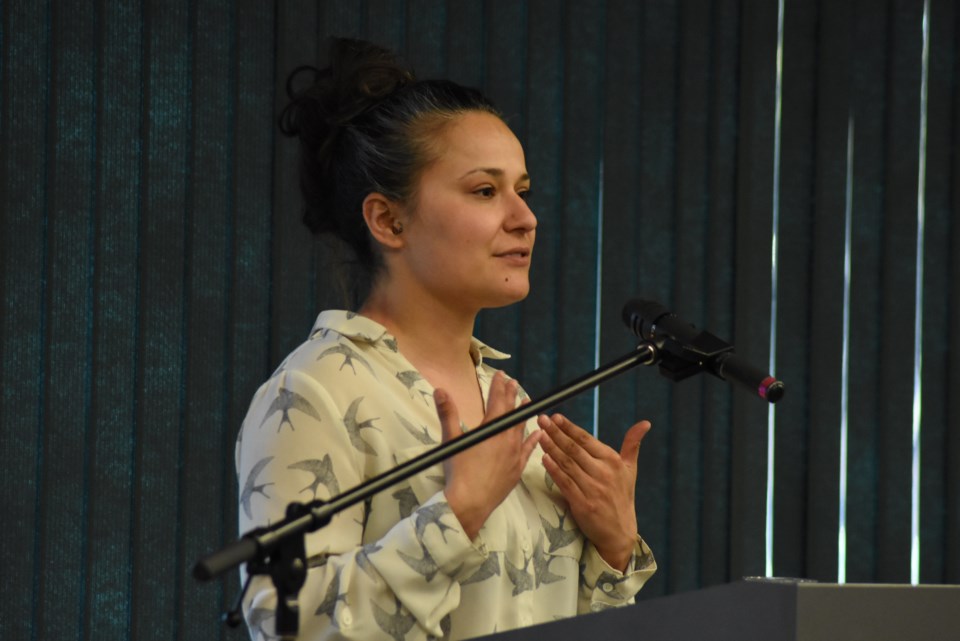By her own admission, Cassandra Kowalchuk was lost when she arrived at the Moose Jaw campus of Saskatchewan Polytechnic.
However, she found her path at the school and earned her diploma and continued her education beyond Sask. Poly. Now she is starting her own business in her hometown of Canora. In Kowalchuk’s eyes, her success wouldn’t have been possible without the work of the Indigenous Services at Sask. Polytech.
“Indigenous Services literally changed my life here at Saskatchewan Polytechnic,” Kowalchuk said. “They made sure that I succeeded every single day. And on those days when I was ready to walk out of this building and throw it all away, they didn’t let me. It’s an empowering thing to be part of the community here.”
Kowalchuk was the keynote speaker at Saskatchewan Polytechnic’s Indigenous honour ceremony on March 19.
The Moose Jaw campus honored 22 students. It was one of four honour ceremonies that were hosted across the province to celebrate the hard work, dedication and achievements of Sask. Poly’s Indigenous students. Sask. Polytech has been hosting Indigenous honour ceremonies since 1990. More than 19 per cent of their student population identifies as Indigenous.
Kowalchuk is of Sioux, Assiniboine and Cree ancestry and is from the White Bear First Nation. However, she didn’t grow up with traditional Indigenous cultural values and teaching.
“I didn’t have a very strong educational background. I had dropped out of high school. I had moved quite a bit. I had no traditional family,” said Kowalchuk. “My mother is a product of the 1960s Scoop and she had a very difficult life as a single mother. She was taken away from her traditional family and as a result, me and my sister were very confused about who we were, where we came from and what direction to drive ourselves towards in the world.”
Back to School
Feeling lost, she took some advice and looked at the Sask. Polytech website. She wrote down all of the programs that interested her and chose one at random. It was Geomatics Engineering Technology.
Before she could begin that program she had to complete her high school education.
“I thought I have nothing left to lose,” she said. “I had to step back 10 years and swallow my pride and say ‘I can do this.’
“I didn’t know anybody. I didn’t have the support of many people. When I told (my friends) I was going back to school, they laughed and said ‘oh, you think you’re better than us?’ and I didn’t say anything. I just laughed, but to myself, I thought: ‘I’m not better than anybody, but I can be better than who I am right now. I can better myself for the future. I can make a difference in my life and maybe in somebody else’s.’”
She would achieve all of her academic dreams, but she didn’t do it alone. She said when she started school she was feeling terrified, anxious and lost. However, in her first class in her first week on campus, her instructor put a letter on her desk. Kowalchuk was surprised and confused to receive it, but opened it and found it was from Rosemarie Zaba Stewart, Indigenous Student Advisor, at Sask. Polytech. The letter welcomed her and told her that they were there for her and wanted her to succeed.
“It took me a little while, but I finally made my way down to Rosemarie’s office and I introduced myself and she said ‘I know who you are!’” Kowalchuk said. “That changed the direction of my life here at Sask. Polytech. It made the difference. It made me realize that I could go back to my roots and I could be a traditional person. I could succeed past what anybody every expected of me or what anyone ever believed from me.”
Kowalchuk graduated from the Geomatics Engineering Technology program in 2014 at the age of 29. She went to the British Columbia Institute of Technology to complete her Bachelor of Science. She lives in Canora and is the owner/operator of CDK Drone Services, which offers surveying, geographic information system (GIS) and mapping.
“By coming to Saskatchewan Polytechnic, I’ve had so many opportunities, I’ve had job opportunities, speaking opportunities,” Kowalchuk said.
She left the students with a message to lift each other up and be engaged in each other’s learning.
“Be supportive of each other and be interested in what we’re trying to achieve. Ask what they learned about and what they’re excited about,” Kowalchuk said. “Any time you are feeling down, step back, take a breath and take a look at the people who are here for you. You are very supported.
“We’re showing that we have a purpose and that we can go forth and we can be successful.”




